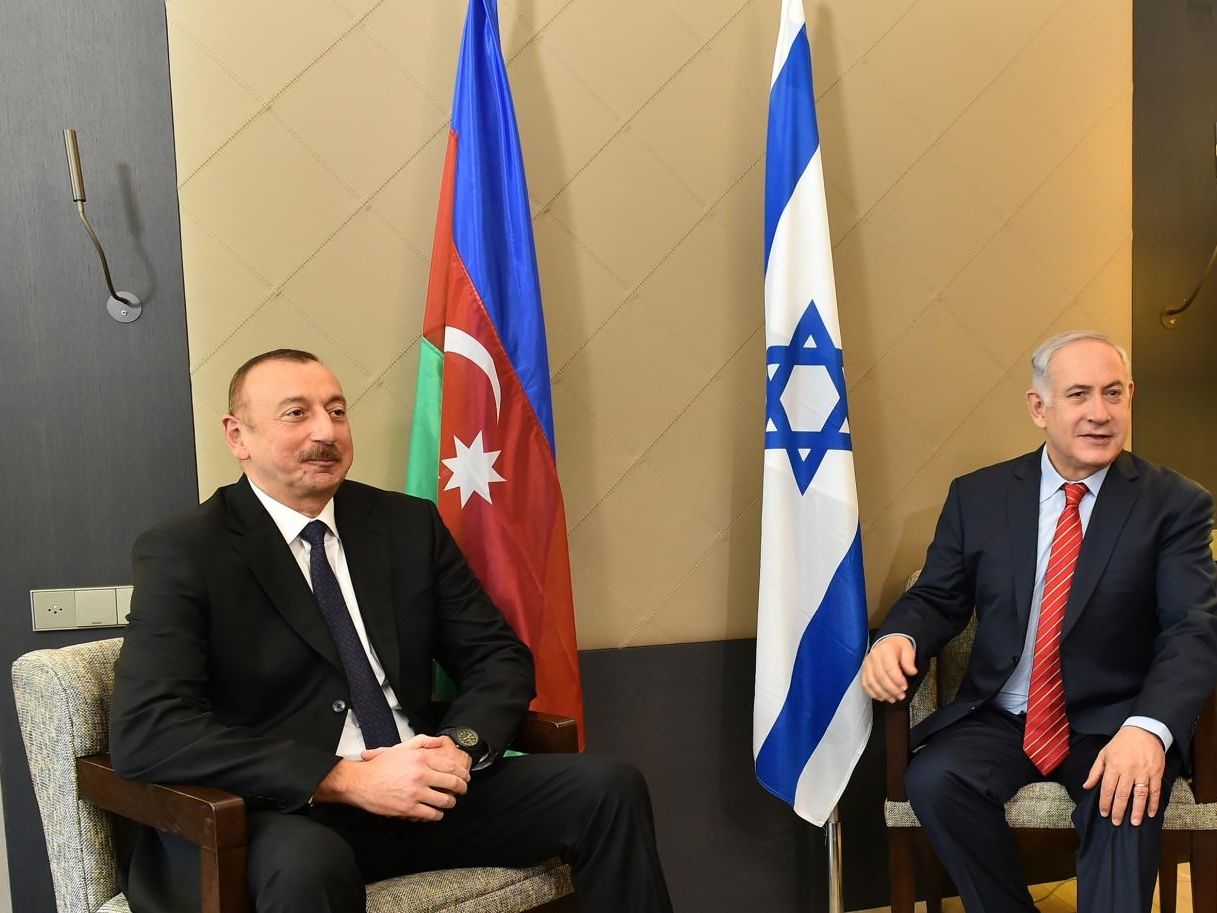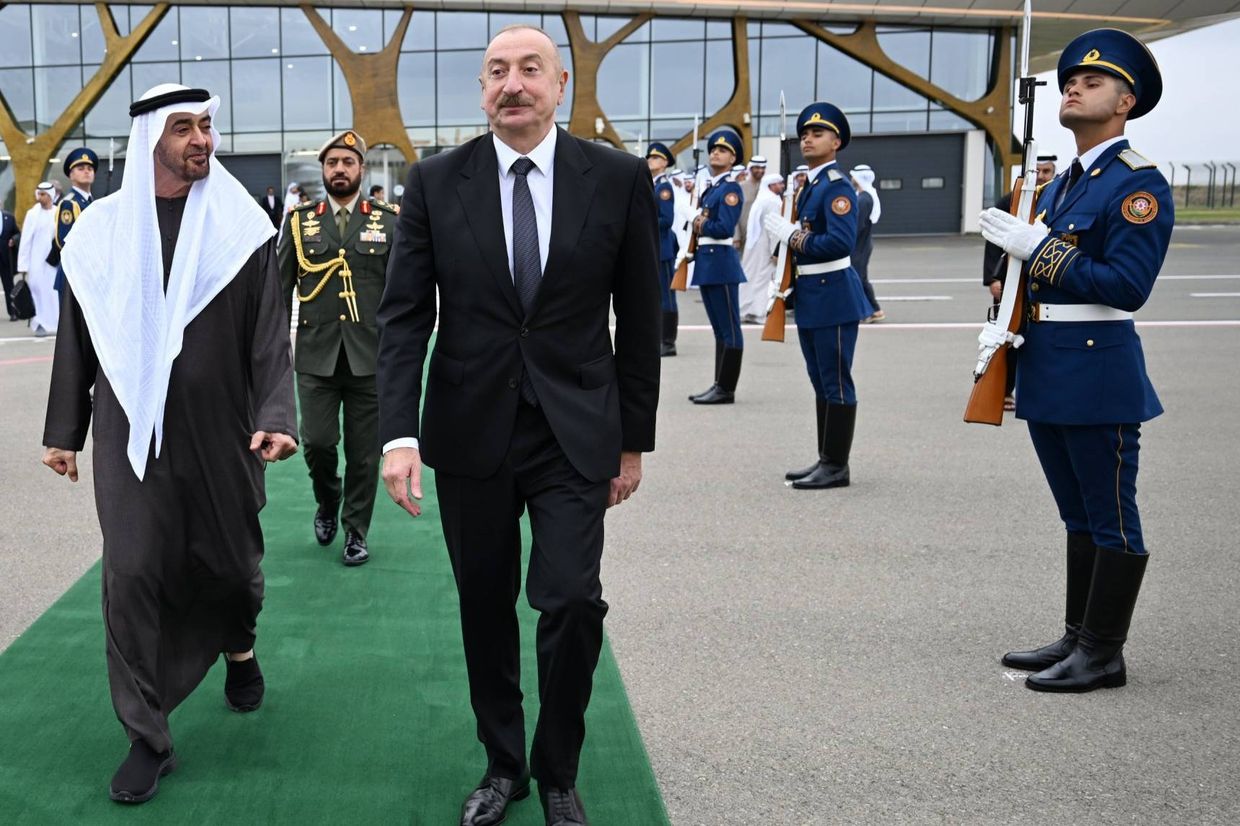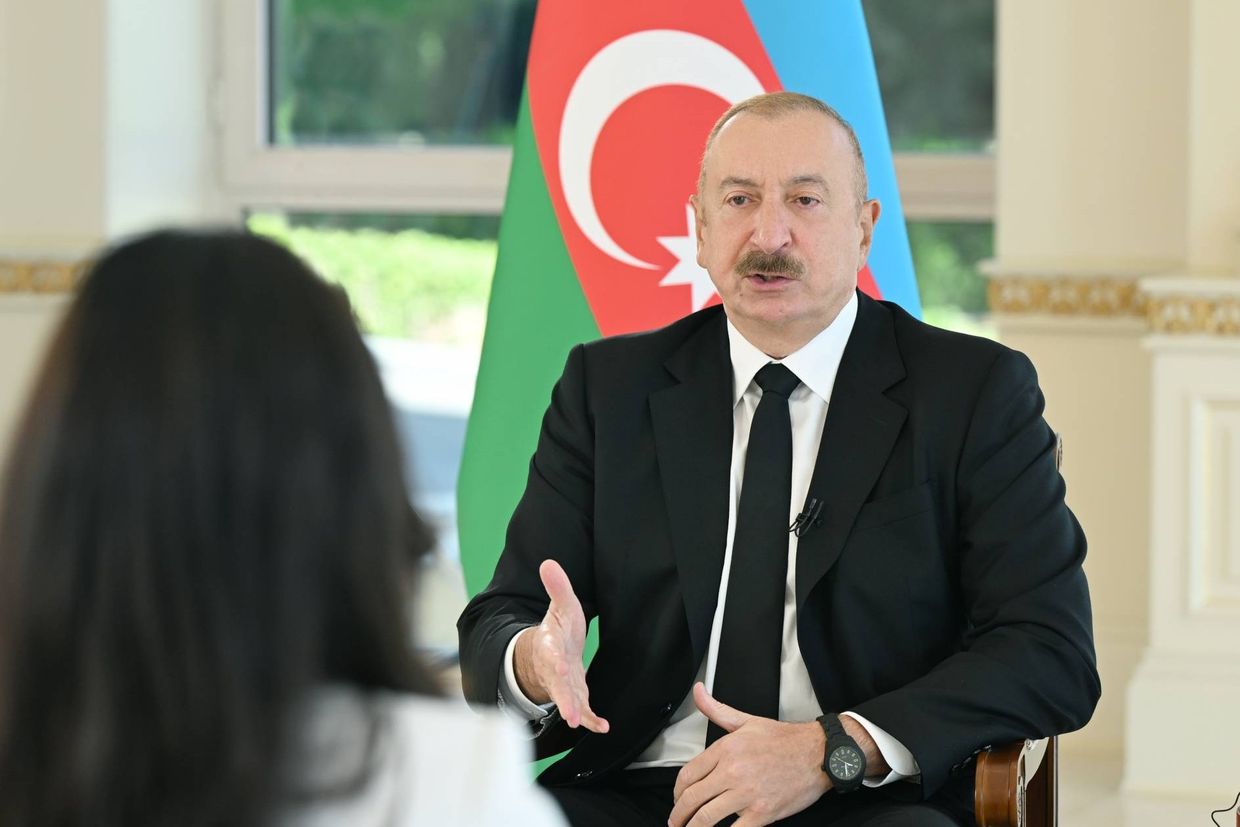Analysis | As Azerbaijan and Armenia reset relations, Baku looks to the Middle East
Azerbaijan’s stature as a regional player has significantly increased in recent years.

Azerbaijani President Ilham Aliyev’s recent interview, in which he described the Bolshevik takeover of Azerbaijan in 1920 as a ‘Russian occupation’, has garnered much attention as relations with Moscow further deteriorate. Yet, less noted in coverage of the interview has been the outlet with which Aliyev spoke — Saudi Arabia’s Al Arabiya television station.
The high profile interview, over an hour in length, was Aliyev’s first with Al Arabiya since 2020 and points to a broader trend in Azerbaijani foreign relations: Baku is now making a concerted effort at raising its profile and influence in the Middle East.
With the Aliyev regime’s attention long dominated by the conflict with neighbouring Armenia over Nagorno-Karabakh, the Middle East has rarely been a focal point of Baku’s foreign policy. This remained true even as Azerbaijan solidified and strengthened its central alliance with Turkey and built up its defence and energy partnership with Israel. Yet, the last year has seen a marked expansion in Baku’s growing physical presence across the Levant and relations with the Arab world.
Azerbaijan and the new Syria
Seemingly the sharpest pivot in this regard has been the transformation of Azerbaijan's relationship with Syria — under the regime of Bashar al-Assad, Syria had long been viewed by Baku as having backed Armenia in Nagorno-Karabakh, leading to minimal ties between the two countries. Azerbaijan closed down its consulate in Syria following the outbreak of the Syrian Civil War in 2012 and did not re-open it until February 2025, after the notably Turkish aligned forces of Ahmed al Sharaa toppled Assad in December 2024.
The post-Assad period has seen a steady picking up of Syria–Azerbaijan relations. Azerbaijan’s government sent a high-level delegation to Syria this past May, with Azerbaijan’s Deputy Prime Minister Samir Sharifov visiting Damascus. That visit featured talks with Sharaa and other top Syrian officials aimed at exploring ‘avenues for cooperation with the country’s transitional government in the fields of economy, energy, culture, and education’. This was followed by Sharaa’s own visit to Baku in July, where the Syrian leader met with Aliyev and Syria’s Energy Ministry signed a memorandum of understanding with Baku’s state-run energy company SOCAR. The Azerbaijani readout produced by the Aliyev–Sharaa talks stated that a ‘project of exporting Azerbaijani gas to Syria from Turkey will be implemented in the near future’, the first ever initiative to bring Azerbaijani gas to an Arab country.

Indeed, less than a month on from the presidential meeting in Baku, the Turkish region of Kilis hosted an opening ceremony for a Turkish–Syrian pipeline, where Turkish, Azerbaijani, Syrian, and Qatari officials jointly announced the start of Azerbaijani natural gas deliveries to Syria. Officials have since stated that 1.2 billion cubic metres of Azerbaijani gas have been allocated for Syria this year, with more to likely come.
Beyond energy, the traditional route of Azerbaijani outreach, the last year has seen a growth in Baku’s influence around Syrian issues writ large. Since December’s ouster of Assad, Baku has increasingly become the go-between for Israel and Turkey, the two regional powers most invested in Syria, both of which have strong ties with Azerbaijan. In April, Baku hosted behind-closed-doors talks between Israeli and Turkish policymakers seeking to avert direct conflict between the two Middle Eastern powers as they vied for influence in Syria.
Hikmet Hajiev, one of Aliyev’s top foreign policy advisors, later stated in June that Baku had hosted more than three rounds of such deconfliction talks.
Speaking at a forum in April, Aliyev noted ‘both countries are close friends of Azerbaijan’, going on to say that ‘despite legitimate concerns and despite quite a high level of mistrust, still, there can be found the grounds for normalisation […] Azerbaijan is doing everything in its power to facilitate the process’.
Aliyev has continued to make public pro-Israel comments, even as such positions spur anger from Turkey, where pro-Palestinian sentiment is much higher.
Baku doubles down on Israel
Ties between Israel and Azerbaijan are nothing new. Both states have long nurtured a relationship, marked by mutual concerns around Iranian influence, Azerbaijani oil flowing toward Israel, and Israeli weapons making their way to Azerbaijan.

Turkey’s strong opposition to Israel amid Jerusalem’s destructive campaign in Gaza has complicated Azerbaijan’s relationship with Israel, but by no means deterred it. In fact, as Syrian ties have grown over the course of the last year, so too have Israeli relations taken on new and ambitious forms.
In terms of energy, February 2025 saw SOCAR’s first purchases in Israel’s Mediterranean gas fields, placing physical SOCAR assets within Israeli maritime territory for the first time.
Turkish pressure did drive Azerbaijan to remove Israel from customs records of energy shipments in 2025. But Israeli government sources reported to Haaretz that they had ‘received a promise from the Azerbaijanis that the strategic relations will continue, including in the energy sector’. Azerbaijani oil has continued to reach Israel by way of intermediary parties — including other state-owned Azerbaijani firms.
On a political level, this year has seen a concerted effort by Azerbaijan, Israel, and advocates for both countries in the US, in promoting the concept of a trilateral security partnership between Baku, Jerusalem, and Donald Trump’s Washington. The office of Israeli Prime Minister Benjamin Netanyahu confirmed speculation around such efforts in March, saying it is in discussions ‘to establish a strong foundation for trilateral cooperation between Israel, Azerbaijan, and the US’. Articles across American and Israeli media, often written by pro-Israel or pro-Azerbaijan commentators, now regularly advocate for the inclusion of Azerbaijan in an expanded Abraham Accords — despite Azerbaijan having recognised Israel since independence.
‘Azerbaijan has been involved in the Middle East for some time’, Joseph Epstein, head of the Turan Research Centre, told OC Media.

From Epstein’s view, Azerbaijan’s interest in the Middle East has grown substantially since 2020, saying that ‘Baku has increased cooperation with the Gulf and has been particularly active in Syria’.
Speaking of Azerbaijan’s regional approach, Epstein argued that while ‘the motivations differ by country, there is a clear overall trend: Baku is positioning itself as a trusted regional mediator’.
Yet, this year’s events have likewise demonstrated the apparent limits of the Azerbaijan–Israel partnership. This was most clear in June, when Israel engaged in a 12 day air campaign against Iranian nuclear, military, and government targets — a period of time that saw Azerbaijan urge de-escalation and caution, especially in Iran’s ethnically Azerbaijani region of Tabriz, which saw substantial Israeli bombardment.
Promising partners in the Gulf
Yet a third axis of Azerbaijani relations with the Middle East is between Baku and the energy-rich monarchies of the Gulf Cooperation Council (GCC). These countries, which have seen an explosion of wealth in recent decades due to energy exports, are now actively partnering with Baku in numerous sectors. Qatar, alongside Turkey, financially backed the pipeline now bringing Azerbaijan’s gas to Syria. With Baku developing domestic renewable energy, the UAE’s Masdar and Saudi Arabia’s ACWA Power firms have built out major roles in Azerbaijan, building the country’s largest solar and wind energy farms respectively.
Ties appear particularly strong with the UAE. This summer, Aliyev struck a bilateral Comprehensive Economic Partnership Agreement (CEPA) with Emirati leader Sheikh Mohamed bin Zayed Al Nahyan on the sidelines of Emirati-hosted peace talks with Armenian Prime Minister Nikol Pashinyan in the run up to this summer’s Washington summit. Authorities touted the CEPA as opening opportunities for more direct Emirati investment in Azerbaijani energy and logistics, building on the reported 36% growth in bilateral trade in 2024.

While it may seem that the core of the relationship between the GCC countries and Azerbaijan is economic, Aliyev and Sheikh Mohamed have made little secret of hopes for broader political cooperation. Sheikh Mohamed made an official visit to Baku in 2024, the first ever visit of a UAE head of state to Azerbaijan, with the two signing a strategic cooperation agreement. Following the signing of that agreement, Aliyev addressed Sheikh Mohamed, saying ‘under your leadership, your country has attained remarkable success, establishing itself as one of the most developed and successful nations in the world. I know that your successful experience serves as an example for many countries’.
This comment from Aliyev illustrates a broader idea potentially undergirding Azerbaijani–Gulf ties. For Azerbaijan, a hydrocarbon-rich and highly authoritarian state, the GCC countries likely offer a highly appealing development model. These small states have become incredibly prosperous, internationally influential, and open to global businesses, and have done so without compromising closed political systems or socially conservative values. Such a programme likely strikes a chord with Baku, where the authorities have worked in recent decades to build hyper-modern buildings and attractions in Baku reminiscent of Dubai or Abu Dhabi.
Sheikh Mohamed made a second visit to Azerbaijan just this September, where both he and Aliyev underscored their interest in upgraded relations. Perhaps alluding to a more politically inflected relationship, the trip brought Sheikh Mohamed not only to Baku, but to the symbolically central city of Shusha (Sushi), recaptured by Azerbaijani forces in the Second Nagorno-Karabakh War in 2020. In the ensuing lavish coverage in Azerbaijani government media, one commentator described Azerbaijan as ‘the new magnet of the Persian Gulf’ and wrote of the ‘personal and trusting communication between President Ilham Aliyev and Sheikh Mohamed bin Zayed’ and ‘the special spiritual closeness of the two leaders’.
During his recent Al Arabiya interview, Aliyev remarked that ‘for 17 years since I assumed office, until we liberated [Nagorno-Karabakh], that issue was number one, number two, and number ten’. The statement, perhaps somewhat overstated, nevertheless does communicate the dominating nature the conflict with Armenia had over Baku’s policy.

Now, however, Azerbaijan is roughly two years on from a total victory in Nagorno-Karabakh, an event that likely resulted in freeing up political imaginations and simultaneously created the sense in Baku of having arrived as a rising regional power in its own right.
‘The resolution of the [Nagorno-Karabakh] conflict has freed political and diplomatic bandwidth for Baku’, Epstein said.
‘Azerbaijan is now seeking to shift from a singular focus on territorial recovery to a broader foreign-policy agenda’.
Fuad Shahbazov, a Baku-based analyst, roughly concurred with Epstein’s appraisal.
‘Azerbaijan is moving beyond its traditional reliance on Turkey and Israel by positioning itself as an energy and connectivity hub’, Shahbazov told OC Media.
‘With Russian peacekeepers gone and a peace treaty with Armenia within reach, Baku can shift its focus outward’ and is an ‘increasingly relevant partner for the Middle East even without projecting military power’.
At the same time, the Middle East itself has drastically changed in a manner that is conducive to Azerbaijani influence. The steadfast alliance with Turkey now opens doors to participation in Syria with a newly pro-Turkish government in Damascus. To the south of Syria, Israeli relations have deepened in regards to energy and international political coordination. Even as Turkish–Israeli relations have disintegrated in the wake of Gaza’s destruction, Azerbaijan appears to risk neither relationship by maintaining ties with both states and is even granted new diplomatic influence as a broker between the two. In the Gulf, the dramatic growth in wealth and political influence has granted greater potential to any and all cooperation between the GCC and Baku while providing a seemingly appealing model for political and economic organisation.
Baku’s diplomatic advances are the most novel in the Arab world, but are not limited to it. Azerbaijan, traditionally embroiled in its own direct neighbourhood of the South Caucasus, is now a player in the Middle East in terms of energy, economy, and politics.










